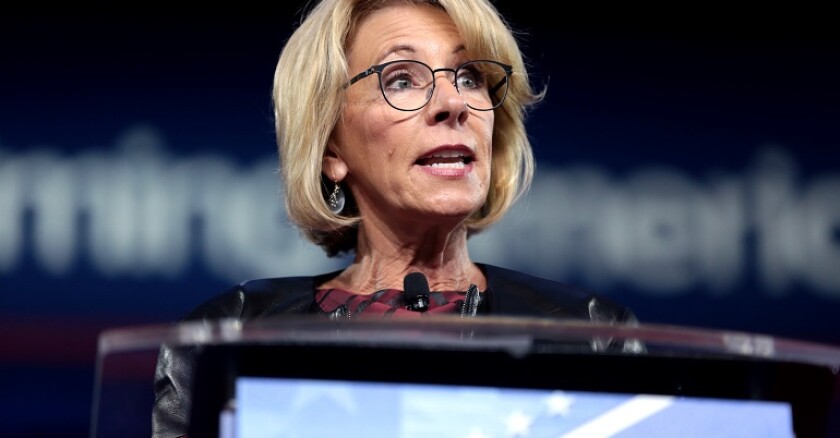The budget calls for a $1.1 billion investment in “school choice,” which includes $500 million in federal grants to school districts willing to expand and experiment with it. States and municipalities would receive additional federal aid if they support private-school voucher programs or open enrollment policies where the money follows the student to a school, public or private. The proposal also would allow some federal funds to be used to build new public charter schools, although it's unclear how much. Such funding would mark another significant policy change for the Education Department, as the federal government has historically provided little to no funding for school construction at all.
Additionally, schools would be able to use Title I money, funds normally designated to offset operating costs at schools with a high concentration of poor students, to assist with school choice programs. Critics contend that would siphon off funds necessary for operating urban public schools.
What the new spending isn’t, according to the Trump administration, is a federal voucher program.
"To be clear, there is no federal voucher program. The [private-school voucher] grant program would support states who apply for funding to develop school choice programs, and those States' plans must adhere to Federal law," Department of Education (DOE) spokeswoman Liz Hill told Education Week.
Trump’s budget request also includes an additional $7 billion in spending on education, a 10.5 percent increase, with money going to support STEM, childhood intervention in the opioid crisis and post-secondary vocational training.
Louisiana, Maryland, Wisconsin and Washington, D.C., are among the handful of jurisdictions with private-school voucher programs, which either run as direct payments to parents to use state and local funds to pay for private schools or tax credits to offset school tuition.
The rationale is that choice gives parents the freedom to pick the quality and type of education their child receives, tilting the balance of power in education policy away from school districts, union and politicians to better represent the interests of parents.
“If you don’t have school choice, the only power you have is to vote. And that gives a parent almost no power,” says Neal McCluskey, director of the Center for Educational Freedom at the Cato Institute. “School choice fundamentally changes that because it says, 'Parents, if you are not satisfied with the education your child is getting, you have the money to take your child somewhere else.'”
Ultimately, proponents of school choice say the current network of traditional public schools fails to accommodate children with varying degrees of aptitude and learning styles.
“You can try one-size-fits-all," McCluskey says, "but you cannot make one size fit all.”
Critics contend that private-school vouchers pull down the education system as a whole -- widening achievement gaps and exacerbating segregation -- while only providing limited improvements to student performance. A 2017 study by Martin Carnoy, a Stanford University professor and research associate at the Washington-based Economic Policy Institute, showed “small improvements in voucher schools -- in high school graduation and college enrollment rates,” but couldn’t determine whether those improvement were a result of voucher school “shedding lower-performing students or engaging in positive practices.” The study also noted that high school graduation rates have risen sharply in the last decade
Carnoy’s study looked closely at Milwaukee, which operates the largest and longest running voucher program in the nation. The program showed no tangible evidence of student gains as a result of vouchers.
While Trump's proposal is certainly a boon to those who support school choice, even some conservatives are worried about its impact on education policy.
“Anything to move away from the public school monopoly is a good thing,” says Corey DeAngelis, policy analyst for Cato's Center for Educational Freedom. “But under the plan, you run the risk of the federal government putting itself in charge of local education."
DeAngelis is worried the federal government, through its funding of charter expansion, will give charters that are aligned with federal policy a funding advantage over operators whose policies and curricula don’t match up. In the end, the federal government might choke out choice.
“What we really want is a set of alternatives and bunch of choices," he says. "But if we have the federal government designing choice, we could be left with fewer choices.”









